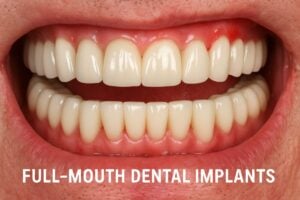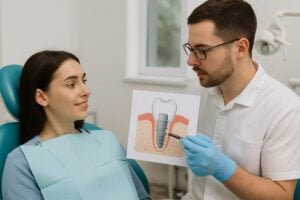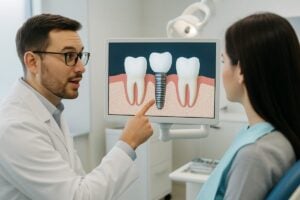An implant in bone in Louisville, KY refers to a metal or ceramic post placed into the jaw to replace a missing tooth root. Patients often ask about an implant in bone because it can restore chewing, speech, and appearance more naturally than dentures. This guide explains candidacy, the placement and recovery process, risks, and practical next steps so you can decide if an implant in bone is right for you.
What is an implant in bone?
An implant in bone is typically a titanium or zirconia post surgically placed into the jawbone to act like a tooth root. After placement the bone gradually fuses to the post — a process called osseointegration — which creates a stable base for a crown, bridge, or full-arch restoration. Good bone contact is essential: it keeps the implant steady and helps it last for many years.
Common uses include replacing single crowns, supporting implant-supported bridges, and anchoring full-arch restorations. An implant in bone in Louisville, KY can often let you eat and speak like you did with natural teeth.
Who is a good candidate for an implant in bone?
Bone health and quantity
To place an implant in bone, you need enough jawbone volume and reasonable bone density. If bone is thin or low, we may recommend bone grafting or a sinus lift before placing the implant. In many cases an implant in bone in Louisville, KY can be placed after simple grafting or with advanced planning to avoid grafting.
General health and oral factors
Overall health matters. Conditions like uncontrolled diabetes, active gum disease, heavy smoking, or poor oral hygiene can raise the risk of complications and implant failure. Most patients with controlled chronic conditions can still receive an implant in bone after appropriate medical clearance and oral care.
How we evaluate you
Evaluation usually includes a dental exam, medical history review, and 3D imaging. At our office we use CBCT scans to map bone shape and nerve locations so we can plan the safest position for an implant in bone in Louisville, KY.
What to expect during placement and recovery for an implant in bone
The surgical steps
The general timeline is:
- Consult and planning with 3D imaging
- Placement of the implant in bone (sometimes with grafting or a sinus lift)
- Healing period for osseointegration
- Attachment of the final crown, bridge, or denture
Placement typically takes less than an hour for a single implant. Complex cases may use the in-house surgical suite and sedation options for comfort. An implant in bone in Louisville, KY can sometimes be restored same-day with temporary teeth, depending on stability and planning.
Recovery timeline and aftercare
Initial recovery is a few days to a week for swelling and soreness. Osseointegration usually takes 3–6 months. During healing you’ll follow a soft-food diet for a short time, maintain gentle oral hygiene, and take any prescribed antibiotics or pain meds as directed. Regular follow-up checks confirm the implant in bone is integrating properly.
Risks and signs to watch for
Risks include infection, implant failure, nerve irritation, and sinus issues for upper implants. Contact your provider if you have increasing pain, persistent swelling, pus, numbness that doesn’t improve, or loose restorations.
Advanced technology and personalized care for implant in bone at Harmon Dental Center
Harmon Dental Center uses advanced tools to make placing an implant in bone in Louisville, KY safer and faster. We use CBCT imaging for precise bone mapping, Primescan® digital impressions to capture accurate models without messy putty, and an on-site full-mouth implant lab for tight control over fit and timing. Our Primemill® and in-house 3D printers allow same-day milling and surgical guide production, reducing surprises and speeding treatment. A fully equipped surgical suite and sedation options help manage complex cases comfortably.
Dr. Bradley Harmon brings years of training and community-focused care to each implant case. He and the Harmon Dental Center team keep procedures efficient and gentle while treating patients like family.
Next steps if you’re considering an implant in bone
To prepare for a consultation, bring any recent X-rays or medical records and make a list of questions like:
- Am I a good candidate for an implant in bone in Louisville, KY?
- Will I need bone grafting or a sinus lift?
- What is the estimated timeline and cost?
- What sedation and pain control options do you offer?
If you’re ready, schedule an implant consultation to review your bone health and get a personalized treatment plan. We’ll walk you through options, expected outcomes, and the steps to restore your smile with an implant in bone in Louisville, KY.






